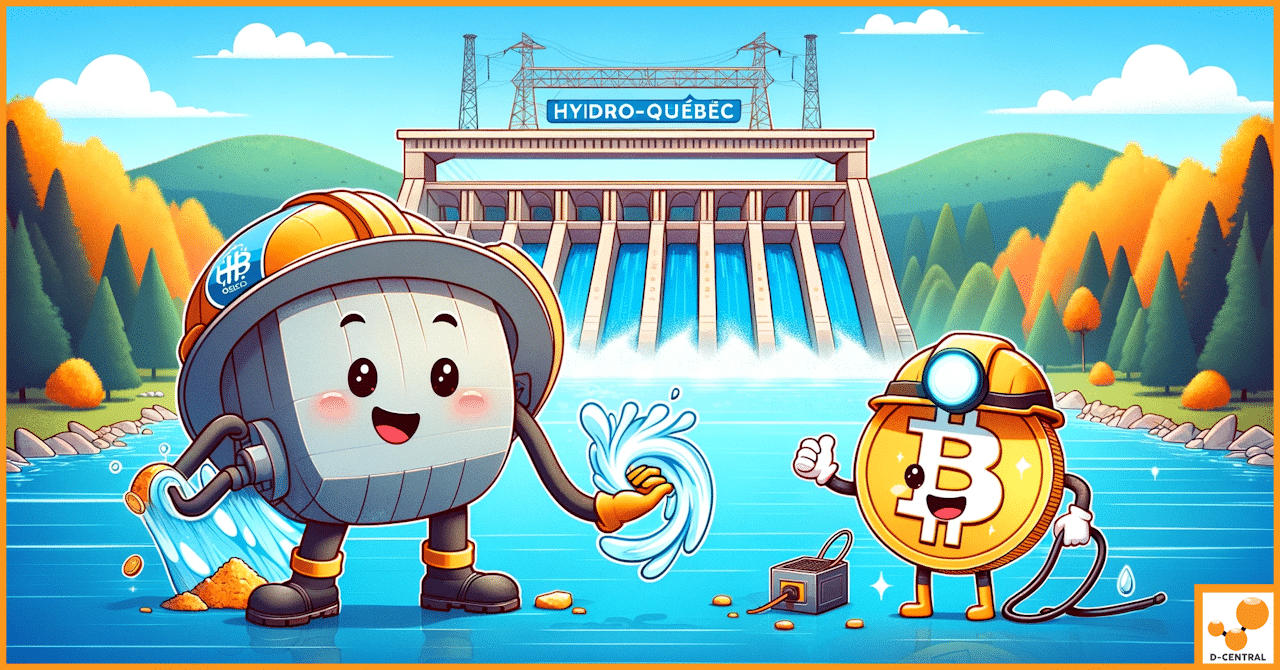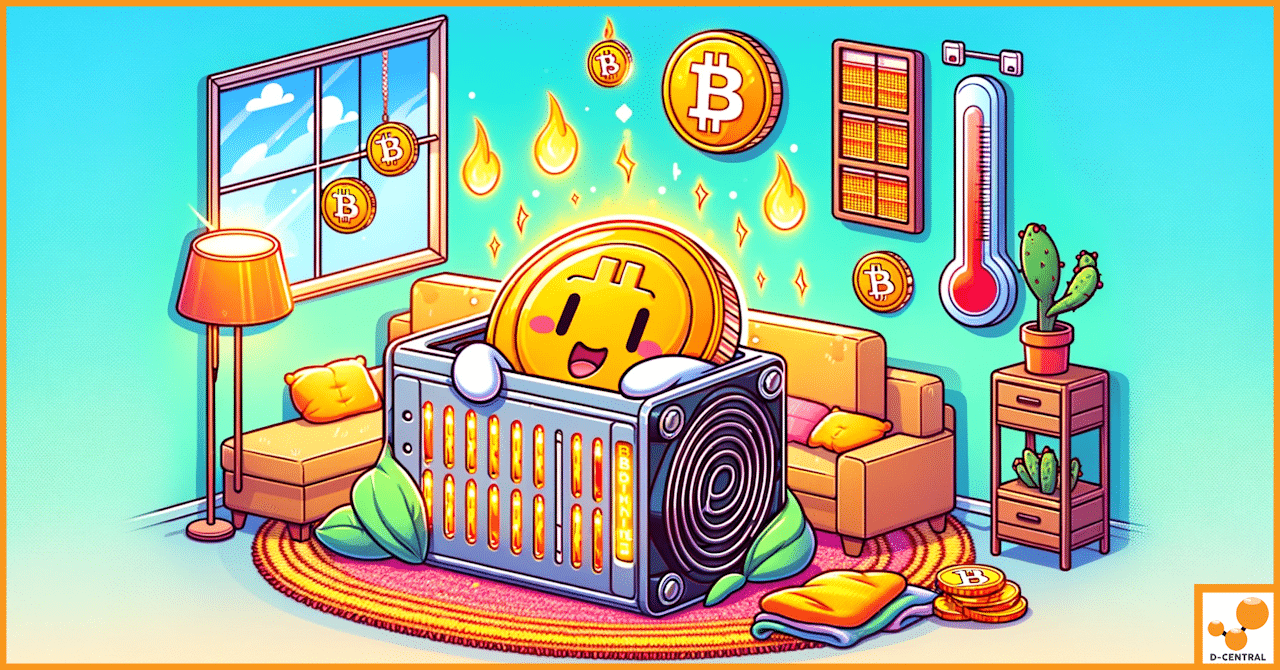
The Untapped Potential: Advocating for Bitcoin Mining as a Key to Quebec’s Energy Future
Quebec, a province rich in natural resources and environmental beauty, stands at the forefront of renewable energy production in Canada.
4479 Desserte Nord Autoroute 440, Laval, QC H7P 6E2

Bitcoin mining has become a popular process for validating transactions and securing the digital currency network. However, the energy required for this process has led to high electricity consumption and heat generation, prompting the need for efficient and sustainable ways to manage energy usage. Meanwhile, the hospitality sector is also exploring innovative solutions to minimize its carbon footprint and reduce operational costs while ensuring guest comfort. One solution that has emerged is harnessing waste heat generated by Bitcoin miners to provide heating for hotels and resorts. This approach presents a sustainable way to manage excess heat produced during mining and offers an opportunity for the hospitality industry to save on heating costs. This article will explore the benefits of integrating Bitcoin miners’ heat into hotel and resort heating systems, the potential challenges they may face, and future trends in sustainable heating solutions.
Bitcoin mining is a crucial component of the cryptocurrency’s decentralized network. Miners use specialized hardware, such as application-specific integrated circuits (ASICs) and graphics processing units (GPUs), to solve complex mathematical problems known as proof-of-work. Solving these problems allows miners to add a new block of verified transactions to the blockchain, thereby maintaining the network’s security and integrity. In return for their efforts, miners are rewarded with newly minted Bitcoins and transaction fees.
Bitcoin mining requires substantial electrical energy to power the specialized hardware. As the mining hardware solves these complex problems, it generates significant heat. The energy consumption and heat production in Bitcoin mining is directly proportional to the computational power of the mining equipment. As the mining difficulty increases and the demand for higher computational power grows, so does energy consumption and heat generation.
The high energy consumption associated with Bitcoin mining has raised environmental concerns, as it contributes to increased greenhouse gas emissions and puts pressure on local electricity grids. The heat generated by the mining process is often considered waste, as it is generally vented into the atmosphere, further exacerbating the environmental impact. Consequently, there is a pressing need for sustainable solutions to mitigate the negative effects of Bitcoin mining on the environment. One solution is using the waste heat generated by mining operations for other purposes, such as heating hotels and resorts. This approach helps manage the excess heat produced during mining and allows the hospitality industry to save on heating costs while reducing its carbon footprint.
Boilers: Boilers are widely used in hotels and resorts for their ability to provide centralized heating. They work by heating water, which is then circulated through a network of pipes and radiators to transfer heat to individual rooms. Various energy sources can power boilers, including natural gas, oil, electricity, or biomass.
Furnaces: Furnaces are another common heating option for hotels and resorts. They heat air, which is distributed throughout the building via ductwork and vents. Furnaces can be fueled by natural gas, propane, oil, or electricity.
Heat pumps are becoming increasingly popular in the hospitality industry due to their energy efficiency and versatility. They work by transferring heat from one location to another using a refrigeration cycle. Heat pumps extract heat from the outside air or ground during winter and transfer it indoors. In the summer, the process is reversed, cooling the building. Heat pumps can be powered by electricity or geothermal energy.
Traditional heating systems in hotels and resorts consume significant energy, leading to high operational costs. The energy consumption and costs associated with these systems depend on several factors, including the size of the building, insulation, climate, and the energy source used. Generally, electric heating systems tend to be less efficient and more expensive than those powered by natural gas or other fuels. Heat pumps, while initially more expensive to install, offer greater energy efficiency and lower operational costs over time.
The environmental impact of traditional heating systems in hotels and resorts is closely tied to their energy consumption and their energy sources. Systems that rely on fossil fuels, such as natural gas, oil, or propane, contribute to greenhouse gas emissions and air pollution. On the other hand, electric heating systems can have a lower environmental impact if the electricity is sourced from renewable energy. However, the environmental impact can still be significant if the electricity is generated from fossil fuels. Heat pumps, particularly those powered by geothermal energy, have a lower environmental impact due to their energy efficiency and renewable energy sources.
Waste heat recovery is a process that captures and reuses the excess heat generated by various industrial processes, including Bitcoin mining. Utilizing the waste heat produced during mining, hotels and resorts can benefit from an alternative, sustainable heating solution. This can be achieved through direct or indirect heat exchange systems that transfer the excess heat from the mining equipment to the hotel’s heating system, providing warmth for guest rooms and common areas.
Hotels and resorts can significantly reduce their energy consumption and associated heating costs by harnessing the waste heat from Bitcoin mining. This alternative heating solution is cost-effective and environmentally friendly, as it repurposes waste heat that would otherwise be vented into the atmosphere. By reducing the reliance on traditional heating systems that use fossil fuels or consume large amounts of electricity, hotels and resorts can minimize their carbon footprint and contribute to a more sustainable future.
Integrating Bitcoin miners’ heat into a hotel or resort requires consideration of various factors to determine its feasibility. The size of the property is crucial in assessing the heat required to maintain comfortable temperatures. Hotels near existing mining facilities can benefit from easier integration and reduced costs for transporting and utilizing waste heat. Assessing the compatibility of the current heating systems with the integration of Bitcoin miners’ heat is also essential.
Two primary strategies can be employed to integrate Bitcoin miners’ heat into a hotel or resort’s heating system. Direct heat exchange systems transfer the hot air the mining equipment generates directly to the hotel’s heating system. On the other hand, indirect heat exchange involves using a heat exchanger or fluid-based system to transfer the heat from the mining equipment to the hotel’s heating system.
While integrating Bitcoin miners’ heat into hotels and resorts can be beneficial, it may have some challenges. For instance, mining equipment can generate significant noise and vibrations that could be disruptive to guests. Therefore, soundproofing measures and strategic placement of the equipment may be necessary. Maintenance and technical support are also crucial to prevent downtime, and it may be necessary to collaborate with a reliable mining partner or establish an in-house team. Lastly, legal and regulatory considerations such as local laws and policies may impact the project’s implementation, and it is essential to consult with legal experts to ensure compliance.
Integrating Bitcoin miners’ heat into hotels and resorts presents numerous economic and environmental benefits. Utilizing the waste heat generated by Bitcoin mining operations, hotels and resorts can significantly reduce their reliance on traditional heating systems that consume large amounts of energy. This, in turn, can result in substantial cost savings on energy bills, enabling hoteliers to allocate resources to other areas of their business, such as improving guest experiences or investing in other sustainability initiatives.
Moreover, harnessing waste heat from Bitcoin mining operations helps reduce greenhouse gas emissions associated with traditional heating systems that rely on fossil fuels. By lowering their carbon footprint, hotels and resorts can contribute to global efforts to combat climate change and protect the environment.
Implementing innovative and sustainable solutions, such as utilizing Bitcoin miners’ heat, can enhance a hotel or resort’s reputation among guests and the wider community. As more consumers prioritize sustainability and environmentally friendly practices, hotels and resorts that adopt these solutions can differentiate themselves from the competition, attracting eco-conscious travellers and potentially increasing their market share.
In some instances, hotels and resorts that integrate Bitcoin miners’ heat may also benefit from additional revenue streams by hosting mining equipment on their premises. This can provide a valuable source of income, particularly during off-peak seasons when occupancy rates may be lower. Hosting mining equipment can also open up opportunities for collaboration with cryptocurrency companies, fostering innovation and expanding the hotel or resort’s network within the growing digital currency sector.
As awareness of the potential benefits of utilizing Bitcoin miners’ heat grows, several trends and developments are likely to shape the future of this innovative approach. Beyond the hospitality sector, other industries are also beginning to recognize the potential of harnessing Bitcoin miners’ heat for various applications. Greenhouses, data centers, and residential buildings are just a few examples of industries that could benefit from this sustainable and cost-effective heating solution. As more success stories emerge, the adoption of Bitcoin miners’ heat in various sectors is expected to grow, driving further innovation and development in the field.
As the demand for more energy-efficient Bitcoin mining solutions increases, technological advancements in mining hardware and heat recovery systems will likely follow. Improved efficiency, lower energy consumption, and enhanced heat recovery capabilities can make integrating Bitcoin miners’ heat even more attractive to hotels, resorts, and other industries. These advancements may also lead to the developing of new, more versatile applications for waste heat recovery from Bitcoin mining operations.
Integrating Bitcoin miners’ heat with other renewable energy sources, such as solar or wind power, can further enhance the sustainability and cost-effectiveness of heating solutions for hotels and resorts. By combining multiple renewable energy sources, the hospitality industry can reduce its reliance on traditional, non-renewable energy sources and minimize its carbon footprint. This trend towards hybrid renewable energy systems is expected to gain momentum as the global focus on sustainability and clean energy continues to grow.
In conclusion, utilizing Bitcoin miners’ heat as an alternative heating solution presents many benefits for hotels and resorts. It provides significant cost savings, reduces greenhouse gas emissions, and enhances the industry’s reputation for sustainability and innovation. Moreover, hosting mining equipment can potentially generate additional revenue streams. As the world shifts towards environmental sustainability, the hospitality industry must continue to explore innovative and eco-friendly solutions. Harnessing waste heat from Bitcoin mining operations offers a unique opportunity for hotels and resorts to achieve these goals while enjoying the economic benefits of reduced energy costs. This integration is just one example of how industries can become more energy-efficient and sustainable. Continued innovation in this field is essential for further advancements in waste heat recovery, renewable energy integration, and overall sustainability. By embracing these innovations, the hospitality industry can play a crucial role in combating climate change and promoting a cleaner, more sustainable future for all.
Q: What is Bitcoin mining?
A: Bitcoin mining is a crucial component of the cryptocurrency’s decentralized network. Miners use specialized hardware, such as application-specific integrated circuits (ASICs) and graphics processing units (GPUs), to solve complex mathematical problems known as proof-of-work. Solving these problems allows miners to add a new block of verified transactions to the blockchain, thereby maintaining the network’s security and integrity. In return for their efforts, miners are rewarded with newly minted Bitcoins and transaction fees.
Q: How can Bitcoin miners’ heat be used as an alternative heating solution?
A: Utilizing the waste heat produced during mining, hotels and resorts can benefit from an alternative, sustainable heating solution through direct or indirect heat exchange systems. These systems transfer the excess heat from the mining equipment to the hotel’s heating system, providing warmth for guest rooms and common areas.
Q: What are the environmental benefits of using Bitcoin miners’ heat as a heating solution?
A: Harnessing waste heat from Bitcoin mining operations helps reduce greenhouse gas emissions associated with traditional heating systems that rely on fossil fuels. By lowering their carbon footprint, hotels and resorts can contribute to global efforts to combat climate change and protect the environment.
Q: What challenges may hotels and resorts face when integrating Bitcoin miners’ heat?
A: Challenges may include noise and vibrations from mining equipment, the need for maintenance and technical support, and legal and regulatory considerations such as local laws and policies.
Q: What future trends and developments can be expected in utilizing Bitcoin miners’ heat?
A: Future trends and developments may include the adoption of Bitcoin miners’ heat in various sectors, technological advancements in mining hardware and heat recovery systems, and integrating Bitcoin miners’ heat with other renewable energy sources such as solar or wind power.
DISCLAIMER: D-Central Technologies and its associated content, including this blog, do not serve as financial advisors or official investment advisors. The insights and opinions shared here or by any guests featured in our content are provided purely for informational and educational purposes. Such communications should not be interpreted as financial, investment, legal, tax, or any form of specific advice. We are committed to advancing the knowledge and understanding of Bitcoin and its potential impact on society. However, we urge our community to proceed with caution and informed judgment in all related endeavors.
Related Posts

Quebec, a province rich in natural resources and environmental beauty, stands at the forefront of renewable energy production in Canada.

The Antminer L3+ is a highly celebrated model within the realm of cryptocurrency mining, particularly noted for its prowess in

In the dynamic world of cryptocurrency mining, the Antminer S17+ has emerged as a cornerstone of efficiency and power. Manufactured